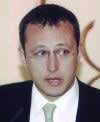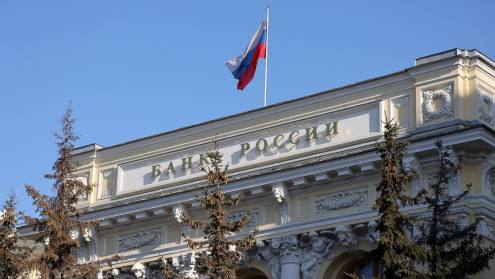Alexander Kotcherguine, executive director of MDM Financial Group, noted that reform of the banking sector was still an important unresolved issue, with Russian banking still lagging behind other sectors of the economy. “Nevertheless, we have a team at the central bank that is committed to reform and they have done more than any previous team, so that is a positive sign,” he said.
“We expect things to happen in the next nine to 12 months. Approval of the deposit insurance law was a very strong signal to the market. This piece of legislation had been under review for almost 10 years and its approval sets the stage for other matters that we expect to introduce later this year or early in 2005,” said Mr Kotcherguine.
Rapid sector changes
From a sector perspective, Mr Kotcherguine said that, despite the lack of infrastructure for reform, changes were taking place rapidly. Growth in deposits and loans at the end of the first quarter were about 30% and 50% year on year, respectively. “This is a very high growth industry from a very low base,” he said. “The anticipated reforms therefore present a great opportunity for investors. From the perspective of individual banks, there have been key developments that affect the leading names. There has been a greater focus on strategy and for the first time in many years we can adjust our forecasts for the longer term.”
There had also been improvement in risk management, said Mr Kotcherguine, implying that banks, while expanding rapidly, are taking a more cautious approach to risk. “Most of the key value drivers will be macro-driven and independent of individual banks,” he said. “We are expecting a sovereign-grade rating later this year or early in 2005 and we are bullish on the bank reform measure. We believe Russia will be joining the World Trade Organization (WTO) within the next two to three years, obviously on Russia’s terms, and this will be a major value driver for the banking industry that will help valuations.”
Emmanuel Volland, director of financial services ratings at Standard & Poor’s (S&P), said his key message was that S&P saw an improvement in the profile of the Russian banking sector that was largely being driven by external macro-economic conditions. “At the same time, we see some key structural issues that need to be tackled before we continue to upgrade the banks,” he said.
S&P has upgraded Russia six times since 1999 but has yet to assign it an investment-grade rating. The weakness of the banking sector is cited as a key issue that needs to be addressed. “When you look at the current average rating of Russian banks, you see that at the end of May 2004 this was B-, one of the lowest levels in the world,” said Mr Volland.

Emmanuel Volland: potential for loans in the Russian market is huge
Ratings evolution
“Looking at the evolution of the ratings in the past four years, it is clear that the recovery of the banking sector has lagged behind the sovereign and corporate sectors. We now have Russian banks in three categories, from triple C to B and double B. We have seen some regular upgrades in the past two or three years. The equity market grew more than three-fold in the past two years; there is high yield GDP growth prospects of about 6% for the current year; interest rates have fallen rapidly; spreads on Russian government bonds and private bonds have also narrowed.”
Mr Volland cited the fact that Russian banks returned to the international debt market in 2003, raising about $3bn in Eurobonds, and that there is a strong pipeline for this year. “All these developments are positive but we maintain our B- rating for several reasons,” he said. “Interest margins are starting to drop rapidly and have fallen by about a third in the past three years. The average net interest margin in 2003 was about 3% for Russian banks. We see a clear trend towards competition and expect margins to continue to drop.
“We’ve also seen some deterioration in terms of efficiency, with most banks investing heavily in new IT systems and management. In terms of profitability, we see a huge dependence on trading gains, accounting for a third of profitability. Most new investment has been funded by capital gains in the stock market and the drop in spreads.” All these factors made it difficult to assess the core profitability of Russian banks.
On the positive side, he said, the potential for the Russian market was huge, taking into account the total size of the banking sector and the small loan portfolio. Total lending as a percentage of GDP was slightly in excess of 20%, which was exceptionally low for an emerging market country. For example, the ratio in Egypt was 60% and in Europe it averaged some 100%, he said.
Marcia Tarter, head of CEEMEA corporate bond research at UBS, said that in fiscal 2002, Russian banks were seen as the weakest link in the Russian sector. “This was the year that investment bankers came up with a covenant that was one of the most important fundamental factors for investors, the Tier 1 ratio,” she said. “Investors were not convinced that you could lend beyond three years because the credit risk culture and management ability were lacking. Today, what gives bondholders better security is the fact that they believe they are aligned with shareholder interest.”

Marcia Tarter: “We expect S&P to upgrade Russia to investment grade this year”
Risk appetite
Ms Tarter said 2003 was a stupendous year, in which the sovereign benchmark came in at 200 basis points (bp). During the year, Alpha Bank tightened 400bp, outperforming the sovereign. “This is just an example of the risk appetite in the market,” she said. “Price discretion should now be more of a game. If this is true, issuers have to realise that price formation will be the most important part of the current year’s marketing campaign.”
With the development of the banks, what was Russia’s weakest sector had become a de facto investment sector, Ms Tarter said. “There are third tier credits, top private banking groups and investment grade. We expect S&P to upgrade Russia to investment grade this year and if this is the case, we should see a more dramatic tiering of the banking sector. Because there is an investment sector with peers in the market that allow for comparisons, the sector has allowed for ratings tiering and also maturity, which is very important for duration management and portfolios. Since we now have a spectrum of yield curve in duration as well as ratings, banks have taken the forefront, not only in the smaller, shorter-dated issues, but in the ECP market.”
UK-Russia trade ties
Bill Rammell, parliamentary under-secretary of state for foreign and Commonwealth affairs, referred to the strength of UK-Russia trade links, highlighted by the fact that Britain is now Russia’s biggest investor. Addressing the conference, he said that about 400 British companies operate in Russia and last year UK exports to Russia rose by 43% to more than £1.4bn. “In 2003, the UK provided 15% of all inward investment in Russia and that is something we should strongly welcome,” he said.
Russia was at a critical stage of development and from a UK business perspective, to be engaged and involved at this stage would reap dividends in the longer term, said Mr Rammell. “There is no doubt about the scale of Russia’s transformation of the past 12 years,” he said. “Last year, we celebrated the 450th anniversary of relations between Britain and Russia. Our political, cultural and trade ties continue to flourish in an extremely strong way. Today our partnership extends well beyond bilateral interests to global issues, such as terrorism, international crime and drug trafficking, environmental degradation and the spread of disease. I think it’s absolutely right that we are engaging with Russia on those issues.”
Mr Rammell said it was crucial that Russia deepened its links with the EU, the G-8, the WTO and NATO. He said Russia had an important contribution to make towards international peace and stability. “It is timely that we’re meeting just after the EU-Russia summit at which there were two significant developments. The first was the protocol for Russia’s entry into the WTO, a measure that we strongly support. There was also the very welcome statement by President Putin about the Kyoto Protocol and that Russia’s move towards ratification would be speeded up – something we had been pressing for.
“The international community should work with Russia, not least in support of internal reform that will help Russia’s own development and enable it to play a greater role in world affairs. The development of democracy, human rights protection and a free media in an open society is central to Russia’s long-term growth and stability. Britain therefore maintains a continuous dialogue with the Russian government on those issues,” said Mr Rammell.











